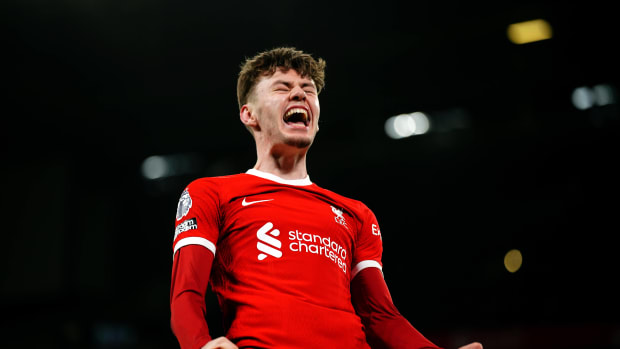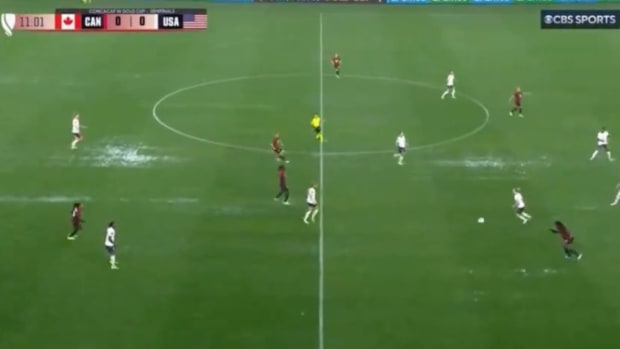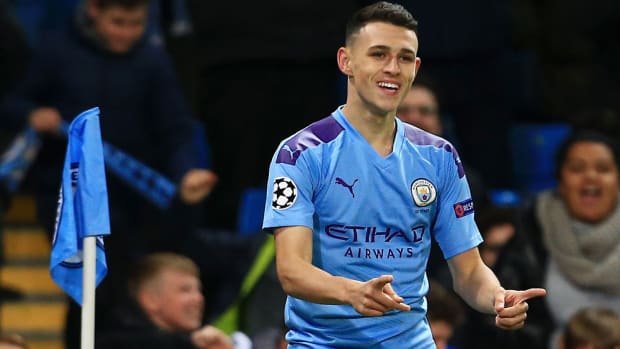Why Messi's Seventh Ballon d'Or Triumph Is Different Than His Others
For all of the change that has transpired around Lionel Messi in recent months, it's the most welcome development of the bunch that has the 34-year-old Argentine maestro holding the Ballon d'Or trophy once again
Lost in the chaos surrounding his abrupt Barcelona exit and rapid pivot to PSG was a year in which he performed at a prolific level. It was not a peerless level of prolificacy, though. It took something else that was new—an influential run en route to a major international title—to renew his grasp on global soccer's top individual prize.
Messi previously won the Ballon d'Or in 2009, '10, '11, '12, '15 and '19, years in which his club contributions were the clear foundation for his individual success. Barcelona won the treble in '09, set a La Liga points record in '10 and did the league–Champions League double in 2011. In the '12 calendar year, Messi scored a ridiculous 91 goals, 79 of which came for Barcelona. The club may have missed out on the league and UCL titles, but his individual greatness was overwhelming and record-setting. The '15 season brought another treble and '19 another domestic title for which Messi was the catalyst. The common thread throughout his wins—aside from outperforming chief rival Cristiano Ronaldo those years—was his showing out for Barcelona.
Even in leading Argentina to the World Cup final 2014—and winning the golden ball in that tournament, however deserved it may or may not have been—he still finished runner-up to Ronaldo in the Ballon d'Or voting.
So it's unique that in 2021, as he accepts the award in Paris as a resident of the city and no longer a visitor, that his national team contribution was as responsible as anything for his record seventh Ballon d'Or trophy. Messi, a fulcrum of one of the weakest Barcelona sides in two decades, still led La Liga in scoring with 30 goals, but Barça finished third in the league and was handled with ease by Messi's current team, PSG, in the Champions League round of 16. It did, for whatever it's worth as it relates to this award, win the Copa del Rey.
Since moving to PSG, Messi has been subpar, at least according to his lofty standards, and surely has accomplished nothing spectacular enough just yet to offset the feats of Robert Lewandowski, Karim Benzema, Mohamed Salah and others at their respective clubs.
Indeed, it was leading Argentina to Copa América glory, and ending a national trophy drought that stretched back to 1993, that was Messi's crowning achievement and put him back on the Ballon d'Or radar. He was a one-man tour de force in carrying La Albiceleste to the final, with four goals and five assists—involvement on nine of Argentina's 11 goals through the semifinals. The irony was that in the final his teammates, for a change, picked him up and put the finishing touches on the title with a win over rival Brazil. But Argentina doesn't have that title without Messi, nor would it have qualified for the World Cup with such relative ease—at least in comparison to the 2018 cycle—without Messi's six goals.
After being burdened by the weight of his country and not yet delivering to the point of national acceptance, it was the weight of his accomplishments for his country that led him back to the summit.
It's not like there aren't worthy also-rans. Lewandowski, who would have won last year's award in a landslide had it not been canceled due to the pandemic, has remained as prolific as ever for Bayern Munich and just set the single-season Bundesliga scoring record. Benzema's brilliance has kept Real Madrid afloat and in contention both domestically and abroad, and although his return to France's national team coincided with a stunning last-16 exit at the Euros, his individual play could not be blamed. His four goals led France and were tied for second-most in the competition. (The optics of his potentially winning days after being found guilty for his role in a long-running sex tape blackmail scandal involving former teammate Mathieu Valbuena is another story.) Benzema's international teammate—and potential club teammate as soon as next summer—Kylian Mbappé, bottled whatever chance he had with a subpar Euros, though PSG's failure to win Ligue 1 or the Champions League likely capped his ceiling as well.
Arguably no top-level player has been in better form since the summer than Salah, but that alone isn't enough to offset the achievements of some of his counterparts, and it doesn't help his case that Liverpool did not win any major title. Then there's the curious case of Jorginho. The pro-Jorginho crowd will point to his title-winning success with both Chelsea (Champions League) and Italy (Euros), and while it's true he's a vital figure for both teams and a very fine player, it's not plausible to consider that he's positioned himself among the truly elite individuals in the game. If the Azzurri's PK shootout vs. England goes differently, for instance, he's not remotely close to being part of the conversation. Team trophies being used as the conduit to determine the single best player has always been a flawed exercise. While it's more likely that a starring player whose teams have achieved at the highest level has the résumé befitting of a Ballon d'Or winner, it perhaps should not be the most heavily weighted criteria to develop a short list, as it so often proves to be.
That doesn't mean it can't be a differentiator between contenders, though, and in Messi's case, one significant, international trophy that comes with a juicy narrative is what sets him apart among the voters. We may be a little ways into the decrescendo of the Messi-Ronaldo era, but the absolute end is not here just yet.
If nothing else, Messi's seventh trophy all but ensures he'll end with more than Ronaldo when both of their careers are done. It's difficult to envision a scenario in which Ronaldo, at 36, wins two more. That's something that may not matter much to Messi, probably means more to Ronaldo (despite his Instagram comments Monday) and certainly means plenty to the social media and message board posters who have obsessed over the individual rivalry that's overshadowed a team sport for well over a decade.
The hourglass will continue to run on their time at the top, though, and if the start to Messi's time at PSG and the limitations on Ronaldo's Manchester United are any indication, another new face—and just the second since 2008—is likely to seize the spotlight in '22.
The timing of the voting will matter, with the World Cup taking place in November and December. Presumably, the vote will come after and take the showpiece event into consideration. Based on the pace they're currently on, Mbappé, Salah, Benzema and Lewandowski are as solid bets as any. Erling Haaland, who finished 11th in the voting this year, figures to enter the mix as well, though Borussia Dortmund's elimination from the Champions League in the group stage and Norway's failure to reach the World Cup put a cap on what he'll be able to accomplish on a team level.
Then again, should Messi's club form pick up—especially with Neymar now sidelined for up to eight weeks—and Argentina continue to ride the recent good vibes to a World Cup title, who's to say one more Ballon d'Or is out of reach? If no other candidate does enough to separate himself from the pack based on individual performance combined with team achievement, this year is proof that Messi can ride the colors of his country to another pot of gold.
More Soccer Coverage:







